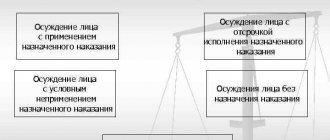If a person has gone missing, a “catastrophe” with the situation from a legal point of view will help resolve the application for recognition as missing. You can apply for free and view recommendations for preparation. If you have any questions, you can ask a lawyer.
|
Reasons for recognizing a citizen as missing
It is necessary to recognize a citizen as missing in various situations.
An interested person may apply to court to establish this fact in order to:
- receiving a pension or benefit from the state;
- deregistration of a citizen;
- registration of a relative at the residence address, if the consent of the missing owner is required;
- privatization of property when used under a social rental agreement;
- distribution of housing to citizens who are on the housing register;
- establishing orphan status;
- adoption of a child.
If a citizen is recognized as missing, the heirs do not have the right to receive his property and dispose of it. This norm is reflected in Article 1113 of the Civil Code of the Russian Federation. The right to open an inheritance appears only when a person is declared dead through the court.
What does missing and missing mean?
Cases when citizens lose contact with relatives and loved ones, unfortunately, occur quite often. According to experts, this is due to the unstable economic situation, as well as political instability.
Very often, people disappear while traveling abroad to work or in the desire to create a successful marriage with foreigners. All this carries the risk of breaking family, as well as legal ties with the missing person.
To search for such a missing person, a period of time is allocated, during which active searches are carried out by relatives and friends on their own, as well as by the police and other government agencies. This period is established by law and is one year.
For people who have disappeared abroad, a special international search system is provided. Interested parties should also contact police departments. Further searches will be carried out by connecting foreign services, as well as representatives and embassies located in different countries. It should be understood that if a person disappears even abroad, he retains all rights to living space.
During the absence of the missing person, responsibility for the maintenance of his home falls on his relatives. Also, such powers can be transferred to persons living with the missing person in the same living space. If he is absent and the search string expires, such people can lay claim to the missing citizen’s living space.
It is also worth noting that in the event of a disappearance of a person who has a living space, all utility payments for it are deferred. Payments on them must be made after the person is found, or payment will be made by the new owner.
Reasons
In accordance with Article 42 of the Civil Code of the Russian Federation, the main sign of the disappearance of a citizen is his absence from his place of residence for a year.
If it is impossible to set a reference date, you need to focus on the first day of the next month. Courts take into account various factors in the disappearance of a person when considering a case.
They check the presence or absence of:
- information about the deliberate concealment of a person from creditors and investigative authorities;
- intentions to go to work in another country, region, or change place of residence;
- a serious illness that could cause memory loss or death;
- important documents that were left at the place of residence;
- family conflicts that provoked the citizen’s relocation;
- statements about searching for a missing person;
- procedures for rapid re-registration of property rights.
The legislative framework
The legislation of the Russian Federation introduces the concept of a missing person, determines the procedure for conducting a judicial procedure, establishes legal consequences and restoration of the rights of a citizen upon his appearance. These issues are addressed in Art. 42-45 of the Civil Code of the Russian Federation (Civil Code of the Russian Federation) and Chapter 30 (Article 276-280) of the Civil Procedure Code of the Russian Federation (Civil Procedure Code of the Russian Federation).
Why is this concept introduced? The man left and disappeared without a trace, but the body was not found, which means it is impossible to establish the fact of death. He continues to have work and family responsibilities, loans, guarantees, rights to property, etc. This situation causes a lot of problems in labor and family law relations.
To eliminate uncertainty, the concept of “unknown absence” is adopted. In essence, this is a circumstance established by the court when it is officially recognized that a person is unable to fulfill his duties and rights at his place of residence and work due to his physical absence. Such a court decision establishes legal consequences that make it possible to redistribute the rights and responsibilities of the disappeared person.
Grounds for recognizing a citizen as missing
Article 42 of the Civil Code of the Russian Federation clearly states that a person is recognized as missing if no one knows anything about his whereabouts for more than 1 year. In other words, the basis for making a decision is the absence of a citizen at his place of residence and work for unknown reasons, when there is no information about him, and even the police cannot establish his whereabouts. It is important to take into account that the disappearance must be unexpected, i.e. there must be no fact of intentional action (for example, an attempt to hide from the investigation).
To make a positive decision, the following are taken into account:
- lack of information from loved ones about their intention to leave or change their place of residence;
- absence of diseases and injuries that can cause sudden death, loss of memory or coordination (mental abnormalities);
- presence at the place of residence or work of an identity card and things of particular value to the disappeared person, as well as money;
- absence of serious conflict situations at work or in the family;
- absence of criminal connections or possible punishable acts, as well as threats from other persons;
- absence of serious financial problems, debts and loans, as well as property disputes;
- disappearing with the vehicle.
- the missing person is a minor child or a pregnant woman.
Valery Sokolov
Lawyer, specialization - family law
The suspicious behavior of close relatives deserves special attention. Circumstances such as late filing of a disappearance report, lack of efforts to establish the location, rapid re-registration or appropriation of property, sudden home repairs, entering into cohabitation with another person, etc. are highlighted. Situations in which the disappearance occurred are also taken into account if they can be assessed as criminal (for example, walking at night or walking through a deserted area).
The period after which a person can be declared missing
A citizen about whom there is no information for 1 year can be recognized as missing. The period begins to be calculated from the moment of receipt of information about the disappearance of a person (for example, absenteeism from work). If it is not possible to establish a specific day of disappearance, then the first day of the next month after discovery of this fact is taken into account. If even the month is not known, then the period is calculated from January 1 of the next year.
Proper plaintiff
Any person interested in the procedure for recognizing a citizen as missing can act as an applicant.
Wives often go to court if a current or former spouse has disappeared, as well as children in the event of the disappearance of a father or mother. But third parties can also submit an application:
- creditors;
- local authorities;
- co-owners of property;
- co-founders.
Before going to court, you need to determine your own status. Government authorities must understand what the applicant’s goal is.
Since 2022, alimony claimants have the opportunity to apply. The legal representative has the right to file a claim if the alimony has not appeared at his place of residence for a year. In this case, the child may be assigned a survivor's pension until the father or mother shows up.
Before making an application
Before drawing up an application, you need to collect a package of documents confirming the applicant’s arguments. In such cases, the applicant must prove the following circumstances:
- interest in being recognized as missing. The court's decision must have legal consequences for the applicant. A document confirming this interest will need to be submitted to the court.
- place of residence of the missing citizen. You will need to provide a certificate from the citizen’s place of residence, a house register, and other documents confirming that he lived at this address until his disappearance.
- absence from place of residence for more than 1 year. The best written evidence of absence will be the materials of the search file of the police department or bailiffs (when debtors are being sought). You can also use certificates from various institutions where the citizen was registered in some way as evidence. Often, acquaintances, neighbors or relatives of the missing person who can confirm the fact of absence are invited to court as witnesses.
Before submitting the application, a state fee is paid, the amount of which corresponds to the fee for special proceedings. The current amount of state duty today can always be found here: state duty to court.
Algorithm of actions
A person is recognized as missing in court.
The case is being considered as part of special proceedings. Based on Article 276 of the Code of Civil Procedure of the Russian Federation, a hearing is scheduled in the court at the applicant’s place of residence.
The procedure is carried out in several stages:
- A citizen draws up a statement of claim. Together with a package of documents, he applies to the city or district court.
- If necessary, witnesses are invited who can confirm the fact of the disappearance of a person.
- Based on Article 278 of the Code of Civil Procedure of the Russian Federation, cases of recognizing citizens as missing are considered in the presence of a prosecutor.
- Having considered the circumstances of the case, the court makes a decision. If it is positive, the document can be used by the plaintiff in various government organizations.
List of documents
The list of documents may change depending on the circumstances of the person’s disappearance and the actions of relatives aimed at searching.
The basic package includes the following papers:
- Plaintiff's civil passport.
- Identification card of the missing citizen (if available).
- Documents confirming relationship with the missing person. If a third party (creditor, authorities) applies, confirmation of the relationship between the parties is required.
- Certificates from the place of residence and work of the absent person. They will help confirm the fact of the loss.
- Documents from the police confirming that search activities were initiated by the plaintiff. In the absence of these measures, the court will refuse to establish the fact.
- Original receipt for payment of state duty.
- Additional documents. These include petitions to call witnesses and request documents.
Sample statement of claim
It is necessary to file a claim in court in accordance with the provisions of Article 131 of the Code of Civil Procedure of the Russian Federation.
It is also necessary to remember the specifics of filling out an application for consideration of a case in a special proceeding. An important point, based on Article 277 of the Code of Civil Procedure of the Russian Federation, is to display the reason for recognizing a citizen as missing. The statement of claim must include the following information:
- the name of the judicial authority that will hear the case;
- data of the applicant, interested parties;
- circumstances of the loss (date, time of loss, duration of absence, factors influencing the loss);
- the purpose of recognizing a citizen as missing;
- list of attached documents;
- date, signature of the plaintiff.
Expenses
When filing a claim in court, you will need to pay a state fee.
In accordance with Article 333.19 of the Tax Code of the Russian Federation, its amount is 300 rubles. If additional participants (lawyer, translator) are involved, a larger amount will be required. It is also worth considering the payment of travel and accommodation costs for third parties.
Deadlines
Submitting an application is possible at any time, but not earlier than 1 year after the loss.
This period is reflected in Article 42 of the Civil Code of the Russian Federation. In this case, the citizen may be declared missing. Some plaintiffs turn to the courts at a later date. If a person has been missing for more than 5 years, the law can recognize him as dead. This is evidenced by Article 45 of the Civil Code of the Russian Federation.
Based on Article 154 of the Code of Civil Procedure of the Russian Federation, consideration of the claim is carried out within no more than 2 months. But, as judicial practice shows, some cases are heard over longer periods.
Judgment
After considering the circumstances of the case, the court makes and announces a decision.
Based on Article 209 of the Code of Civil Procedure of the Russian Federation, the document comes into force 1 month after its announcement. Participants in a trial have the right to appeal. To do this, you must file an appeal. Then, in accordance with Article 335 of the Code of Civil Procedure of the Russian Federation, the decision will come into force after consideration of the complaint.
How to draw up and submit an application for recognition as missing
An application for recognition as missing is submitted to the district (city) court at the applicant’s place of residence (Article 276 of the Code of Civil Procedure of the Russian Federation).
When drawing up an application, you should be guided by the general rules (Article 131 of the Code of Civil Procedure of the Russian Federation), taking into account the specifics established for such applications (Article 277 of the Code of Civil Procedure of the Russian Federation). It is recommended to adhere to the provided sample when drawing up an application to avoid mistakes.
| The current amount of state duty payment today: | |
| state fee to court |
The interested parties include close relatives of the lost citizen, authorities and institutions, where they will then have to apply with a court decision to recognize him as missing.
The text of the application must describe in detail the purpose of applying to the court, the relationship between the applicant and the missing person, the circumstances of the disappearance and the search measures taken.
It should be borne in mind that it makes no sense to go to court before 1 year after the disappearance of a citizen. If there was information about a citizen somewhere during this year and it becomes known to the court, then the claims will be denied. The court has an obligation (Article 278 of the Code of Civil Procedure of the Russian Federation) to request additional information about the missing person. And the court may receive information that this citizen has received a salary or pension over the last year, visited a clinic or bought tickets, or showed himself in some other way. The prosecutor must take part in the consideration of the case.
Arbitrage practice
As judicial practice shows, the claim is satisfied if there is indisputable evidence.
If they are missing, the requirements are rejected. Thus, citizen Zh. filed an application to the court to recognize her husband as missing. According to the plaintiff, the man went to a neighboring area to harvest timber and did not return.
The woman contacted the police, as a result of which the man was put on the federal wanted list. But the search yielded no results.
The woman noted that establishing the fact of absence is necessary to register her son in the apartment of the missing citizen. There were no persons obstructing the satisfaction of the claim. Witnesses were invited to confirm the facts. The court granted the application and made a corresponding decision.
Citizens may face difficulties in being declared missing if the court has reason to believe that the person is a fugitive from justice. But it is possible to achieve a positive result in such cases.
Thus, the plaintiff with three children asked to recognize her husband as missing. She noted that her husband went to work in another country and did not return. The woman filed a police report a month later. Five years later, she contacted law enforcement again, where they noted that the man was wanted as a suspect for committing a crime.
The plaintiff wanted to recognize her husband as missing in order to obtain a survivor's pension for three children, as well as manage her husband's property. But her demands were denied by both the city and regional courts.
The citizen appealed to the Supreme Court of the Russian Federation. After reviewing the case file, he ruled that the lower authorities had made the wrong decision.
Attention! As noted in the Supreme Court, absence for a long period (more than 1 year) can be taken as grounds for recognizing a citizen as missing. At the same time, the fact that a person has been put on the wanted list due to the initiation of a criminal case cannot be a basis for refusal.
How to file a claim
Who can apply to the court:
- relatives and spouse of the absent person, including the former;
- the counterparty of the absent person in a specific legal relationship (for example, a citizen who issued a loan to the missing person);
- dependents;
- organizations (for example, employers), including government agencies, for example the Pension Fund of the Russian Federation;
- other interested parties (to whom, due to the unknown location of a citizen, any damage is caused, their rights and interests are diminished).
The application must be printed and signed. Your representative can sign instead of you if the authority to sign the application and submit it to the court is indicated in the power of attorney (Part 4 of Article 131 of the Code of Civil Procedure of the Russian Federation).
The application must be accompanied by documents confirming that law enforcement agencies conducted a search for the individual, but did not bring any results.
At the same time, the search carried out by bailiffs as part of enforcement proceedings cannot confirm the fact of absence, since the FSSP is not a competent body with the right to search for missing persons (see the decision of the Almetyevsk City Court of the Republic of Tatarstan dated March 27, 2017 in case No. 2- 842/2017).
Consequences of recognizing a citizen as missing
The main consequences of recognizing a person as missing are highlighted:
- Property can be transferred to trust management. In accordance with Article 43 of the Civil Code of the Russian Federation, a trustee may be appointed by the court in relation to the property of the missing person. The agreement can be drawn up before the expiration of 1 year by decision of the guardianship authorities.
- The owner is not deprived of property rights (Article 1012 of the Civil Code of the Russian Federation). In accordance with the agreement, legally significant actions are performed only in the interests of the beneficiary.
- Divorce can be filed unilaterally. Divorce, in accordance with Article 19 of the RF IC, is carried out through the civil registry office in a simplified manner. The basis is the statement of the interested person. A month after the application, a divorce certificate is issued.
- Children are assigned a survivor's pension. If there are dependents, this action is possible only after the citizen is recognized as missing.
How is a survivor's pension calculated?
The exact amount of the pension is calculated by employees of the Pension Fund of the Russian Federation. The amount of the pension depends on whether the missing person was officially employed.
Types of survivor's pension
| Options | Insurance | Social |
| Regulatory regulation | Federal Law “On Insurance Pensions” | Federal Law “On state pension provision in the Russian Federation” |
| Assignment condition | If during his life the missing person was officially employed for at least 6 months | If the debtor had no experience |
| Size in year | Calculated individually, depending on:
| If there is no one breadwinner Until 04/01/2021 – 5,606.17 After 04/01/2021 – 5,751.93 If there is no mother and father Until 04/01/2021 – 11,212.36 After 04/01/2021 – 11,503.88 |
| Additional payments | No | If the family income is less than the subsistence level, then you can apply for an additional payment up to the subsistence level. |
Legal consequences of appearance
As judicial practice shows, a person can return to his place of residence and be found in another place.
In this case, he has the right to:
- receiving property back into your own management;
- housing he owned;
- restoration of marriage;
- reassignment to the previous place of work (if the reasons for the disappearance are forced).
When a missing person is deregistered, his rights are also restored. He can be registered in housing again.
It is also possible to restore a broken marriage. The exception is when the spouse has already entered into an officially registered relationship with another person. This is evidenced by Article 26 of the RF IC.
What does declaring a person dead lead to?
Declaring a person dead by a court does not make him dead. It is not uncommon for people to be detained after a long period of time. In this case, the missing person has the right to protest the fact of his death in court. Along with this, such a citizen may demand the cancellation of all decisions that were made at the time when he was considered dead. Most often these are decisions regarding housing and other items owned by the person believed to be dead.
If a person is declared dead by a court, then everything happens identically to the case when a person actually dies. This means the following:
- The heirs can contact a notary and open a case regarding the inheritance. This is also done within 6 months from the date the testator is declared dead in court;
- If the missing person was married, then it is dissolved by the registry office;
- A man is removed from his workplace.
There are other provisions as well, but it is important to understand that when a court declares a person dead, nothing is different from real death.
Questions from our readers
The process of being declared missing raises many questions. We answer the most popular ones below.
Is it possible to recognize a child support worker as missing and what will this give?
A person may disappear due to unwillingness to pay alimony. When contacting the Ministry of Internal Affairs, this fact must be taken into account.
In accordance with Law No. 229-FZ, when a court decision is made, proceedings for the payment of alimony are opened. A search procedure is also initiated.
The bailiff must send requests to:
- bodies of the Ministry of Internal Affairs;
- banking organizations;
- traffic police;
- Pension Fund;
- Federal Tax Service;
- Rosreestr.
The claimant submits an application to the FSSP. It reflects the details of the court decision, the payer’s data, the period of non-payment, and the amount of the debt.
If, after a search, a citizen is recognized as missing, on the basis of a court decision, you can submit an application to the Pension Fund for a survivor’s pension.
The ex-husband was declared missing, is it necessary to return his property?
Property that was transferred to trust management is subject to return. If the person appears, all rights to real estate are restored in court.
The survivor's pension is non-refundable. The ex-husband was declared absent by the court, so the fact of unjust enrichment is not seen.
Underwater rocks
Various difficulties may arise during the recognition process:
- After being declared missing, the spouse has no right to property. Inheritance is possible only after 5 years after the disappearance, as well as the recognition of the citizen as dead by the court.
- The situation can be complicated by the appearance of a citizen, which makes it possible to cancel a previously made court decision.
- Some citizens are hiding from justice or creditors for a long time, which affects the recognition procedure.
- In the absence of sufficient legal knowledge, it is difficult to contact the judicial authorities and draw up a statement of claim.
Related documents
- Application for inclusion in the register of creditors' claims
- Statement of claim for recovery of the deposit amount, interest on the deposit and penalties in connection with violation of the terms of the bank deposit agreement
- Sample application from a creditor for inclusion in the register of claims of the debtor’s creditors (in the monitoring procedure)
- Sample application for inclusion in the register of creditor claims of the KPK
- Sample application for inclusion in the register of creditors' claims
- Application form to RSA for filing a complaint against an insurance company
- Claim form to the Russian Union of Auto Insurers regarding the actions of the insurance company
- Complaint to RSA about violation of the deadline for payment of the remaining insurance premium under MTPL after early termination
- Complaint to RSA about violation of payment deadlines
- Complaint to RSA about unreasonably reduced payment amount
- Complaint to RSA about illegal refusal to pay
- Complaint to the Central Bank of the Russian Federation for violation of the deadline for payment of the remaining insurance premium after early termination
- Complaint to the Central Bank of the Russian Federation about the underestimated amount of payment under CASCO
- Complaint to the Central Bank of the Russian Federation about an underestimated amount of payment under compulsory motor liability insurance
- Complaint to the Central Bank of the Russian Federation about violation of payment deadlines for compulsory motor liability insurance
- Complaint to the Central Bank of the Russian Federation about violation of the terms of payment of insurance compensation under comprehensive insurance
- Complaint to the Central Bank of the Russian Federation about an unreasonable refusal to pay under CASCO
- Complaint to the Central Bank of the Russian Federation about an unjustified refusal to pay for the theft of a vehicle
- Complaint to the Central Bank of the Russian Federation about unlawful refusal to pay under compulsory motor liability insurance
- Claim to the insurance company for unjustified violation of payment deadlines under compulsory motor liability insurance





